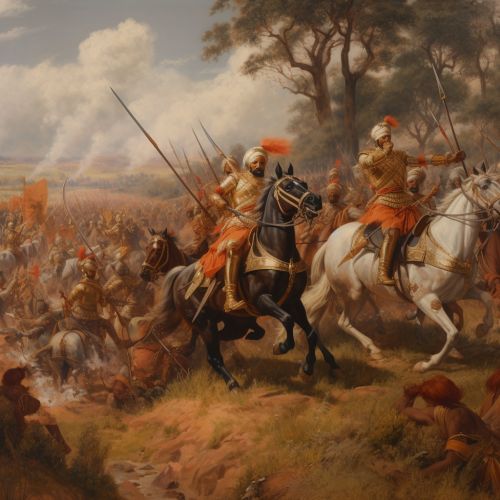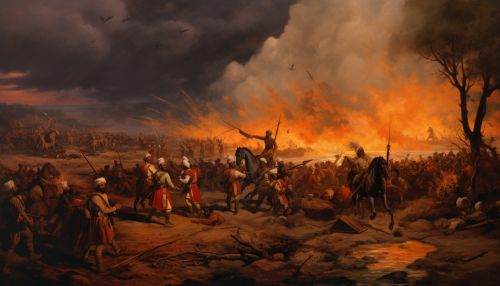Carnatic Wars
Overview
The Carnatic Wars were a series of military conflicts in the middle of the 18th century in India. The conflicts were between the British East India Company and the French East India Company, along with their respective Indian allies. The wars were fought mainly on the territories in India which were dominated by the Nizam of Hyderabad up to the Godavari delta. Throughout the three wars, both the French and British used the same Indian troops, trained in the European style of warfare, to fight one another. The French troops were led by the French Governor-General Joseph François Dupleix, while the British were led by Robert Clive.


Background
The Carnatic Wars were named after the territory of Carnatic in South India. The wars were extensions of the conflicts between the Kingdom of Great Britain and the Kingdom of France, and were heavily influenced by local Indian politics. The wars took place during a period of increasing assertiveness of the European companies when they were starting to transition from traders to colonial powers.
First Carnatic War (1746–1748)
The First Carnatic War was the Indian theatre of the War of the Austrian Succession and the first of a series of Carnatic Wars that established early British dominance on the east coast of India. The war was instigated by disputes over the rights of the British East India Company and the French East India Company in the city of Madras.
Causes
The war was triggered by the arrival of a small French fleet under Bertrand-François Mahé de La Bourdonnais, which came to the Indian Ocean to challenge British power following the outbreak of the War of the Austrian Succession in Europe. The French governor Dupleix seized the opportunity to establish a strong French presence in India.
Course of the War
In 1746, the French captured the British-controlled city of Madras, forcing the British to surrender. The British then sought the help of the Nawab of Carnatic, Anwaruddin Muhammed Khan, who sent an army to besiege Madras. However, the French managed to repel the attack, leading to a stalemate.
Treaty of Aix-la-Chapelle
The war ended in 1748 with the signing of the Treaty of Aix-la-Chapelle, which returned Madras to the British in exchange for the French fortress of Louisbourg in North America. However, the treaty did not resolve the underlying colonial and commercial disputes, setting the stage for further conflicts.
Second Carnatic War (1749–1754)
The Second Carnatic War was a part of the global conflict known as the Seven Years' War. It was triggered by the political vacuum created by the death of the Nizam of Hyderabad, Asaf Jah I, and the Nawab of Carnatic, Anwaruddin Muhammed Khan.
Causes
The war was primarily caused by the contest for power in India among the European trading companies, following the death of the Nizam of Hyderabad and the Nawab of Carnatic. The French supported Chanda Sahib and Muzaffar Jung to take the positions of the Nawab of Carnatic and the Nizam of Hyderabad respectively, while the British supported Nasir Jung and Muhammad Ali Khan Wallajah.
Course of the War
The war saw a series of battles and political machinations as each side tried to install their preferred leaders in power. The French initially had the upper hand, with their candidates Chanda Sahib and Muzaffar Jung being installed as the Nawab of Carnatic and the Nizam of Hyderabad respectively. However, the tide turned in favour of the British with the arrival of Robert Clive, who managed to secure the defection of key French allies.
Treaty of Pondicherry
The war ended in 1754 with the Treaty of Pondicherry, which recognised Muhammad Ali Khan Wallajah as the Nawab of Carnatic, under the suzerainty of the British East India Company. The French were allowed to retain their territories in India but were not allowed to have any political influence.
Third Carnatic War (1756–1763)
The Third Carnatic War was the final phase of the Carnatic Wars and was a part of the global conflict known as the Seven Years' War. The war saw the British East India Company's dominance in southern India.
Causes
The war was triggered by the outbreak of the Seven Years' War in Europe. The French, under the command of Count de Lally, attempted to expand their influence in India at the expense of the British.
Course of the War
The war saw a series of battles in which the British, under the command of Sir Eyre Coote, managed to defeat the French. The decisive Battle of Wandiwash in 1760 saw the French forces being decisively defeated.
Treaty of Paris
The war ended in 1763 with the Treaty of Paris, which recognised British dominance in India. The French were allowed to retain their trading posts in India but were not allowed to have any political influence.
Aftermath
The Carnatic Wars left the British East India Company as the dominant colonial power in India. The wars also marked the beginning of the end of the Mughal Empire, and paved the way for direct British rule over India.
